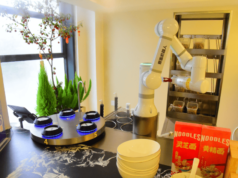IBM made big cloud moves in China—delivering blockchain and internet of things services on its Bluemix platform and partnering with Walmart.
IBM is expanding the footprint of its Bluemix cloud platform in China with the help of internet data center services provider 21Vianet Group, a key partner in the country.
With this move, IBM is further extending its cloud services to China’s developers and incorporating blockchain, the internet of things (IoT) and other data services on Bluemix.
IBM last year tapped 21Vianet to help introduce Bluemix into China to the country’s large and constantly growing developer population. As part of that agreement, IBM said it would provide access to Bluemix technologies, while 21Vianet would provide the infrastructure and be responsible for the end-to-end operation of Bluemix in this major technology market. Both companies also pledged to use the collaboration to build a strong Bluemix ecosystem in China, with the goal of driving other developers and large enterprises to adopt similar models of hybrid cloud-based development.
“The synergies between blockchain and IoT development seem especially promising and offer notable commercial potential in a country with such enormous and enormously diverse industries and markets,” said Charles King, principal analyst with Pund-IT.
Indeed, the Chinese market opportunity is huge, with analysts projecting that the value of the market for IoT technology alone could reach $121 billion by 2022.
“The launch of blockchain and our IoT platform through the IBM Cloud is a tremendous boon for Chinese companies,” Ernie Hu, general manager of cloud technology for IBM China, said in a statement. “Providing the infrastructure of Bluemix, combined with these latest technologies from both IBM and a growing roster of partners and Chinese service providers, will equip our country’s developers with the set of tools they need to fuel more intelligent and advanced innovations across China’s fastest-growing industries, including manufacturing and financial services.”
Meanwhile, as part of this China move, IBM said it is expanding its previously announced partnership with Cisco to provide real-time data analytics to companies managing remote operations in the country, such as oil rigs, factories, shipping companies and mines.
For instance, IBM said CCTV.com is using IoT services on IBM Bluemix to improve the fan experience and viewer engagement of its Tibet Challenge series, which documents 40 cyclists traveling from Sichuan to Tibet. With the Bluemix-based data analysis and sensor tools, CCTV.com can broadcast biometrics of the riders in real time, including information such as geo-location, altitude, speed and heart rate.
“Tapping into IoT technology on IBM Bluemix has enabled our broadcasts to interact with viewers in an entirely different way,” Ma Hua, director of the Interactive Operation Center at CCTV.com, said in a statement. “Being able to stream and interpret critical data from our cyclists in real-time has resulted in a much more engaging experience.”
Steve Zhang, CEO of 21Vianet, said the company is a longtime partner with IBM and is committed to creating an open hybrid cloud ecosystem.”Today, IBM Bluemix operated by 21Vianet is able to help Chinese companies transform and extend their cloud services to developers, helping to support entrepreneurship,” Zhang said in a statement. “We also plan to continue working with IBM to build a robust and comprehensive cloud ecosystem in China.”
In a separate move, IBM, Walmart and Tsinghua University are collaborating to use blockchain to improve the way food is tracked, transported and sold to consumers across China.
IBM said blockchain provides a permanent record of transactions that are grouped in blocks that cannot be altered. Thus it can be used as an alternative to traditional paper tracking and manual inspection systems. Moreover, with blockchain, food products can be digitally tracked from an ecosystem of suppliers to store shelves and, ultimately, to consumers, IBM said.
This collaboration highlights IBM’s belief in the flexibility and adaptability of innovative blockchain solutions across numerous use cases and business scenarios, King noted.
“IBM’s plan to leverage its blockchain solutions in China underscores both the practical and potential value of the technology,” he said. “This effort is designed to address food safety issues, critical concerns in a country that has weathered numerous food contamination crises for over a decade. If it delivers the benefits that IBM, Walmart and Tsinghua researchers plan, the program could provide a framework for ensuring the availability of safe, nourishing food across the whole of China.”
IBM researchers are bringing the company’s blockchain expertise to the project, joining forces with security and authentication experts from Tsinghua University and supply chain, logistics and food safety experts from Walmart.
“Advanced technology has reached into so many aspects of modern life but it has lagged in food traceability, and in particular in creating more secure food supply chains. Our collaboration with Walmart and Tsinghua University is a step of global significance to change that,” Bridget van Kralingen, senior vice president of industry platforms at IBM, said in a statement. “Food touches all of us, everywhere, so we are experimenting in China with Walmart and Tsinghua given the size and scale of food consumption in this country.”






